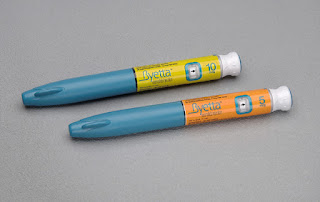Drug information
DRUG INFORMATION ABOUT EXENATIDE
Exenatide is an injectable diabetes medicine that helps control blood sugar levels. This medication helps your pancreas produce insulin more efficiently. Exenatide is used to treat type 2 (non-insulin dependent) diabetes. Other diabetes medicines are sometimes used in combination with exenatide if needed.
Prounciation: ex-N-a-tide
Class: Antidiabetic agent, Incretin mimetic agent
Trade name: Byetta – Injection
Dosage available:solution 5 mcg/dose - Injection,
solution 10 mcg/dose- Injection.
Pharmacology: Glucagon-like peptide-1 agonist that enhances glucose-dependent insulin secretion, suppresses inappropriately elevated glucagon.
All medicines may cause side effects, but many people have no, or minor, side effects.
Most COMMON side effects persist or become bothersome when using Exenatide:
o Constipation; decreased appetite; diarrhea; dizziness; feeling jittery; headache; indigestion; nausea; vomiting; weakness; weight loss.
Seek medical attention right away if any of these SEVERE side effects occur when using Exenatide:
o Severe allergic reactions (rash; hives; itching; difficulty breathing or swallowing; tightness in the chest; swelling of the mouth, face, lips, throat, or tongue; unusual hoarseness); chest pain; fainting; fast heartbeat; severe dizziness; severe or persistent headache, diarrhea, nausea, or vomiting; severe or persistent stomach pain that may radiate to the back (with or without nausea or vomiting); symptoms of kidney problems (eg, change in the amount of urine produced, unusual or persistent pain in the mid to lower back, unexplained swelling); symptoms of low blood sugar (eg, chills, confusion, drowsiness, increased hunger, increased sweating, irritability, nervousness, tremor, blurred vision, weakness).





Comments
Post a Comment